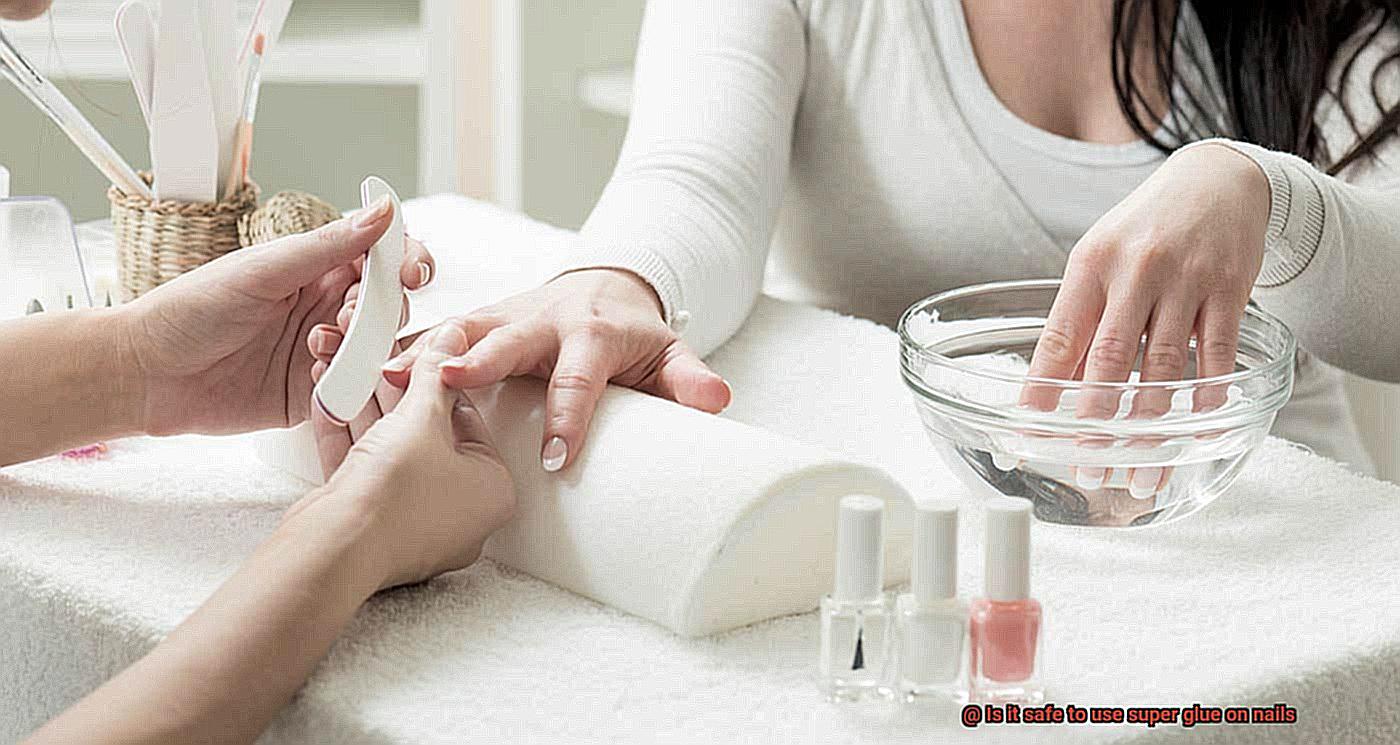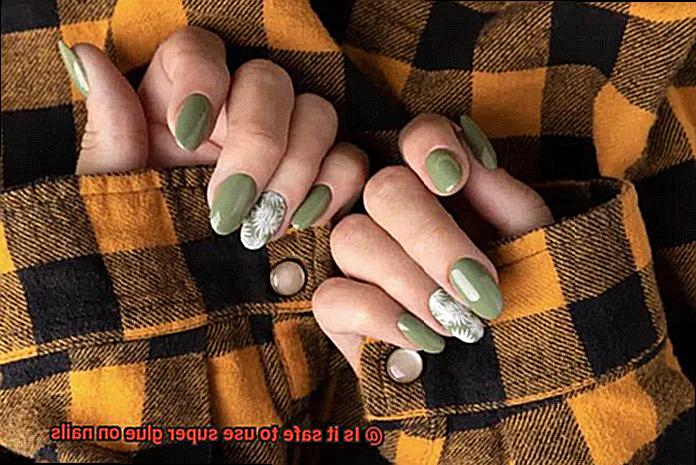Nail trends are always changing, and we’re all on the hunt for new ways to make our nails look fabulous. Some people have even turned to super glue as a secret weapon for their manicures. But before you grab that little tube, let’s talk about safety.
In this blog post, we’re diving into the controversial topic of using super glue on your nails. We’ll explore different perspectives, from professionals to everyday nail enthusiasts like you and me. Get ready to uncover some fascinating insights that will help you decide if this trend is worth the risk. Whether you’re a die-hard nail art lover or just curious about the dangers, get ready for a wild ride where caution meets creativity.
The Pros and Cons of Using Super Glue on Nails
Contents
- 1 The Pros and Cons of Using Super Glue on Nails
- 2 Potential Health Risks of Using Super Glue on Nails
- 3 How to Use Super Glue on Nails Safely
- 4 Alternatives to Super Glue for Nail Repair
- 5 Professional Advice on Using Super Glue on Nails
- 6 Tips for Removing Super Glue from Nails
- 7 Common Mistakes When Applying Super Glue to Nails
- 8 Benefits of Seeking Professional Advice for Nail Care
- 9 Conclusion
Super glue, also known as cyanoacrylate adhesive, is a powerful and fast-acting adhesive that has a wide range of uses. While it can be an effective tool for fixing broken items or attaching materials together, using super glue on nails has both advantages and disadvantages that should be carefully considered.
One of the main advantages of using super glue on nails is its ability to create a quick and secure bond. Unlike traditional nail adhesives, which can take a while to dry and may not provide a strong hold, super glue bonds almost instantly, ensuring that the nail stays in place. This can be particularly beneficial for individuals who lead busy lives and don’t have time to wait for their nails to dry.
Super glue is also known for its durability. Once applied, it forms a strong and long-lasting bond that can withstand daily activities such as typing, washing dishes, or even playing sports. This can be especially helpful for those with weak or brittle nails that are prone to breaking or splitting.
Another advantage of using super glue on nails is its affordability and accessibility. Super glue can be easily found at most supermarkets, drugstores, or hardware stores, making it a convenient option for those who need a quick fix for their nails. It is also relatively inexpensive compared to other nail adhesives on the market.
However, despite these potential benefits, there are several drawbacks and risks associated with using super glue on nails that should not be overlooked. One major concern is the potential damage it can cause to the natural nail bed. Super glue contains chemicals that can be harsh on the skin and nails. When applied directly to the nail bed, it can cause irritation, redness, and even burns. Prolonged use of super glue can lead to further damage, such as thinning of the nail plate or weakening of the natural nail.
Removing super glue from nails can also pose challenges. Unlike traditional adhesives that can be easily soaked off with acetone or nail polish remover, super glue forms a strong bond that can be difficult to dissolve. Attempting to forcibly remove the glued-on nail can result in further damage to the natural nail.
In addition to potential harm to the nails, super glue should also be used with caution due to its toxic nature. Accidental ingestion or inhalation of super glue fumes can lead to serious health issues, such as respiratory problems or gastrointestinal complications.
It is important to note that using super glue as a long-term solution for nail repairs is not recommended. Seeking professional advice from a nail technician or dermatologist for safer alternatives is advised. They can provide guidance on proper nail care and recommend appropriate products that are specifically designed for nail repair.
Potential Health Risks of Using Super Glue on Nails
The practice of using super glue on nails may seem like a quick and easy solution for nail repairs or enhancements, but it comes with potential health risks that should not be overlooked. The composition of super glue, along with the possibility of adverse reactions, can lead to various health issues. Here is an in-depth look at the potential health risks associated with using super glue on nails.
Firstly, one of the main ingredients in super glue is cyanoacrylate, a strong adhesive that binds quickly. When applied to the delicate nail bed, it can cause irritation and allergic reactions. This can manifest as redness, itching, swelling, or even a rash around the nail area. These symptoms can be uncomfortable and may require medical attention if they worsen or persist.
Furthermore, cyanoacrylate in super glue has the potential to damage the nail plate. This can result in brittle, thinning, and peeling nails. Weakened nails are more prone to breakage or infection, making it difficult to maintain healthy nails overall.
In addition to potential damage to the nails, super glue can also cause a burning sensation or pain when applied. This discomfort is especially pronounced if the glue comes into contact with broken or damaged skin around the nail bed. The burning sensation can be quite uncomfortable and may require medical intervention if severe.
Another health risk associated with using super glue on nails is the release of formaldehyde fumes when it dries. Formaldehyde is a toxic substance that can irritate the eyes, nose, throat, and lungs when inhaled. Prolonged exposure to formaldehyde has been linked to more serious health effects. Therefore, using super glue in poorly ventilated areas can further increase the risk of inhaling these toxic fumes.
Moreover, repeated use of super glue on nails can lead to a condition called onycholysis. This condition occurs when the nail separates from the nail bed. The separation creates an entry point for bacteria and fungi, increasing the risk of infections. Infections can cause pain, swelling, and further damage to the nail and surrounding tissue.
To minimize these potential health risks, it is strongly recommended to avoid using super glue on nails altogether. Instead, opt for nail adhesives specifically designed for nail repair or enhancements. These products are formulated to be safer for use on nails and are less likely to cause adverse reactions or long-term damage.
If you have already used super glue on your nails and experienced adverse reactions or discomfort, it is advisable to seek medical advice for appropriate treatment and guidance. A healthcare professional can provide the necessary care to alleviate symptoms and prevent further complications.
How to Use Super Glue on Nails Safely
Using super glue on nails can be a convenient way to fix broken or split nails temporarily. However, it is important to use the glue safely to avoid any potential harm or damage to the nails or skin. Here are some steps to follow for using super glue on nails safely:
Choose the right glue
Not all super glues are suitable for use on nails. Look for a glue that is specifically designed for nail repairs. These glues are often formulated with ingredients that are safe for use on the nails and won’t cause any adverse reactions. Make sure to read and follow the instructions provided by the manufacturer.
Clean and prep the nails
Before applying the super glue, ensure that the nails are clean and free from any oils, lotions, or nail polish. This will help the glue adhere better to the nail surface and ensure a longer-lasting bond. Use a gentle nail polish remover to remove any residue and wash your hands thoroughly.
Apply a small amount
Less is more when it comes to using super glue on nails. Only apply a small amount of glue directly onto the broken or split area of the nail. Avoid applying it onto the surrounding skin as it can cause irritation or damage. Use caution to prevent any contact with your eyes or mouth.
Use a toothpick or nail stick
To apply the glue precisely and avoid getting it on your skin, use a toothpick or a nail stick. Dip the tip into the glue and carefully apply it to the desired area. This will give you better control over the amount of glue you apply and minimize the risk of accidental spills.
Press and hold
After applying the glue, gently press the broken ends of the nail together and hold them in place for a few seconds. This will allow the glue to bond properly and create a strong seal. Avoid using excessive force as it can lead to further damage.
Trim and file
Once the glue has dried and bonded, you may need to trim any excess glue using nail clippers or a file. Be careful not to file too aggressively as it can weaken the bond or cause damage to the nail. Smooth out any rough edges with a nail buffer for a finished look.
Alternatives to Super Glue for Nail Repair
When it comes to nail repair, super glue may seem like a convenient solution. However, its potentially harmful ingredients and strong bonding properties make it far from ideal. Fortunately, there are several alternatives available that are not only safer but also specifically formulated for nail repair.
One popular alternative is nail glue. Designed to bond artificial nails, it can also be used to repair natural nails. What sets nail glue apart is its non-toxic formulation, which is gentle on the nails. With its small bottle and brush applicator, applying nail glue precisely to the affected area becomes a breeze.
Another option is nail adhesive tabs. These adhesive strips serve a dual purpose: attaching artificial nails and repairing broken natural nails. The best part? No harsh chemicals or solvents are needed for their application or removal. Nail adhesive tabs offer a temporary solution, making them a convenient choice for quick repairs.
Some individuals prefer nail wraps or fiberglass resin for their nail repair needs. Nail wraps consist of thin layers of fabric or silk that reinforce and support weak or damaged nails when sealed with a clear top coat. On the other hand, fiberglass resin acts as an adhesive to strengthen nails in need of reinforcement.
For minor repairs, clear nail polish can serve as a temporary fix. While it may not provide the same level of strength and durability as super glue, it can hold the nail together until a more permanent solution is applied.
It is crucial to note that these alternatives prioritize the safety of your nails and skin over sheer strength and durability. For personalized advice on the best alternative for your specific nail repair needs, consulting a professional nail technician or dermatologist is always recommended.
Professional Advice on Using Super Glue on Nails
Super glue, also known as cyanoacrylate adhesive, is a strong and fast-acting adhesive commonly used for various purposes. However, using super glue on nails is not recommended due to several reasons.
Firstly, super glue is not formulated for use on the skin or nails, making it potentially harmful. The delicate and sensitive skin around the nails can experience redness, swelling, and even chemical burns if super glue is applied directly to the nails. To avoid such complications, it is best to avoid using super glue on nails altogether.
Moreover, super glue is not flexible like our natural nails. Nails naturally bend and flex with movements, and using a rigid adhesive like super glue can make the nails brittle and prone to breakage. This can lead to further damage and weaken the overall health of your nails.
If you accidentally apply super glue to your nails or skin, it is crucial to take immediate action. Do not attempt to pull or peel the glue off as this can cause more harm than good. Instead, soak the affected area in warm soapy water to soften the adhesive. Gently rub the area with a soft cloth or cotton swab to remove the glue. If the adhesive does not come off easily, it is advisable to seek medical attention.
Instead of using super glue on nails, it is recommended to opt for nail-specific adhesives that are specifically formulated for use on nails. These adhesives are gentler on the skin and nails and provide better flexibility, ensuring that your nail health is maintained.

In case you are experiencing issues with your nails such as breaks or splits, it is highly advisable to consult a professional nail technician or a dermatologist. They possess the expertise needed to assess your condition accurately and provide appropriate treatment or recommendations.
Tips for Removing Super Glue from Nails
Super glue is a powerful adhesive that can accidentally end up on your nails, causing frustration and potential damage. Fortunately, there are several safe and effective methods for removing super glue from your nails without harming them. Here are some tips to help you tackle this sticky situation:
- Soak in Warm, Soapy Water: Begin by filling a bowl with warm water and adding a few drops of mild soap. Submerge your affected nails in the soapy water for about 10-15 minutes. This gentle soak will help soften the super glue, making it easier to remove.
- Gently Peel Off: Once the glue has softened, use a wooden or plastic tool, like a cuticle stick or an orange stick, to gently peel off the glue from your nails. Avoid using metal tools, as they can scratch or damage your nails.
- Acetone-based Nail Polish Remover: If the glue doesn’t come off easily, try using an acetone-based nail polish remover. Soak a cotton ball in the nail polish remover and hold it against the glued area for a few minutes. The acetone will dissolve the super glue, allowing you to gently rub it away with the cotton ball in circular motions.
- Moisturize Your Nails: Acetone can be drying to your nails, so after removing the super glue, it’s important to moisturize them. Apply a nourishing cuticle oil or hand cream to keep your nails hydrated and prevent any dryness or damage.
- Natural Remedies: If you prefer natural methods, you can try using lemon juice or vinegar to remove the super glue from your nails. Soak a cotton ball in either lemon juice or vinegar and hold it on the glued area for a few minutes. Gently rub the cotton ball over the glue until it starts to dissolve. Rinse your nails with warm water and moisturize as needed.
Remember to be patient and gentle when removing super glue from your nails to avoid any harm. If you have sensitive skin or allergies, it’s always a good idea to do a patch test before using any chemical-based or natural remedies. Additionally, to prevent super glue from getting on your nails in the first place, consider wearing gloves when working with adhesives and cleaning up spills promptly.
Common Mistakes When Applying Super Glue to Nails
Super glue, a handy tool for fixing broken nails or applying artificial ones, can be a game-changer in the world of nail care. However, there are some common mistakes that people make when using super glue on their nails. By avoiding these pitfalls, you can ensure a better outcome and maintain the health and appearance of your nails.
One common mistake is using too much glue. Remember, a little goes a long way when it comes to super glue. Excessive amounts can cause spillage onto the surrounding skin, leading to irritation and potential damage. Moreover, it creates a bulky and unnatural look on the nails, which is far from aesthetically pleasing.
Another mistake is failing to prepare the nails properly. Before applying super glue, ensure your nails are squeaky clean and free from polish or oils. Neglecting this step hampers adhesion and shortens the lifespan of your manicure. Gently buff or file the nails to optimize bonding.
Rushing the application process is another common blunder. Super glue sets quickly, so work efficiently but carefully. Hastily applying the glue can result in uneven distribution and messy-looking nails. Take your time to apply it evenly and precisely for superior results.
Using super glue as a quick fix for broken or split nails is tempting but ill-advised. This adhesive is not designed for long-term use on nails and can worsen the problem. It may cause further damage or hinder natural nail growth. Opt for appropriate nail treatments or seek professional assistance instead.
Lastly, avoid substituting proper nail adhesive products with super glue. While it may provide temporary adhesion, super glue lacks specific nail-friendly formulas found in dedicated nail adhesives. Opting for these ensures a safer and more effective application.
Benefits of Seeking Professional Advice for Nail Care
The benefits of seeking professional advice for nail care are extensive and varied. When it comes to maintaining healthy nails or achieving beautiful manicures, consulting a professional nail technician is a wise choice. Here are some key advantages to consider:
- Extensive Knowledge and Training: Professional nail technicians undergo comprehensive training and possess in-depth knowledge of nail care techniques, products, and treatments. Their expertise allows them to stay updated with the latest trends and developments in the industry, ensuring that they can provide accurate and up-to-date advice.
- Personalized Recommendations: By consulting a professional, you can receive personalized recommendations tailored to your specific nail care needs. They can advise you on proper nail hygiene, suitable products for your unique nail type, and provide tips for preventing common nail problems like breakage or fungal infections.
- Early Detection of Issues: Professionals have the ability to assess the overall condition of your nails and identify any underlying issues that may require attention. Their trained eyes can detect signs of nail damage or infections early on, allowing for prompt treatment and prevention of potential complications.
- Avoiding Common Mistakes: Many people rely on do-it-yourself methods or follow advice from unreliable sources, leading to ineffective or harmful practices. Professionals can debunk myths and provide accurate information, ensuring that you make informed decisions about your nail care routine.
- Access to High-Quality Products: Professionals have access to high-quality products and tools that may not be readily available to the general public. They can recommend suitable products for different purposes, such as strengthening brittle nails or promoting nail growth, helping you achieve the best results.
- Assurance and Peace of Mind: Seeking professional advice offers a sense of assurance and peace of mind. You can trust that you’re receiving guidance from experts who prioritize your safety and well-being. This confidence allows you to relax and enjoy your nail care experience.
- Relaxing Experience: Regular visits to a professional nail technician for treatments like manicures or pedicures can be a truly rejuvenating and pampering experience. It allows you to indulge in self-care while benefiting from the expertise of a skilled professional.
_SGTe9NjJBc” >
Conclusion
Using super glue on nails may seem like a quick fix for a broken or split nail, but it is not a safe or recommended practice. Super glue is not designed for use on the human body, and applying it to your nails can lead to serious health risks.
Firstly, super glue contains harsh chemicals that can irritate and damage the delicate skin around your nails. This can result in redness, swelling, and even painful blisters. Additionally, the strong adhesive properties of super glue can cause your nails to become brittle and weak over time.
Furthermore, using super glue on nails can hinder the natural growth process. Your nails need oxygen to grow properly, and sealing them with super glue prevents this essential element from reaching them. This can result in stunted nail growth and potential long-term damage.
In addition to these physical risks, there are also concerns about the toxicity of super glue. When applied directly to your nails, the chemicals in super glue can be absorbed into your bloodstream through the nail bed. This can have harmful effects on your overall health and well-being.
Instead of resorting to super glue, it is best to seek professional help if you have a broken or damaged nail. A trained nail technician or healthcare provider will have the knowledge and tools necessary to safely repair your nail without causing further harm.
In conclusion, using super glue on nails is not safe and should be avoided. The potential risks outweigh any temporary benefits it may provide.






